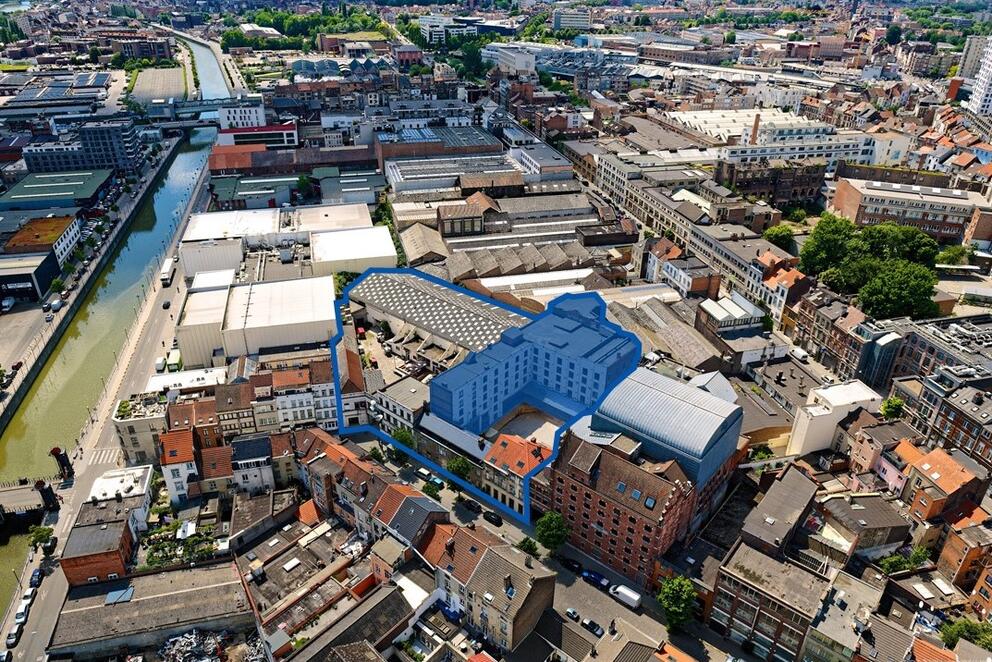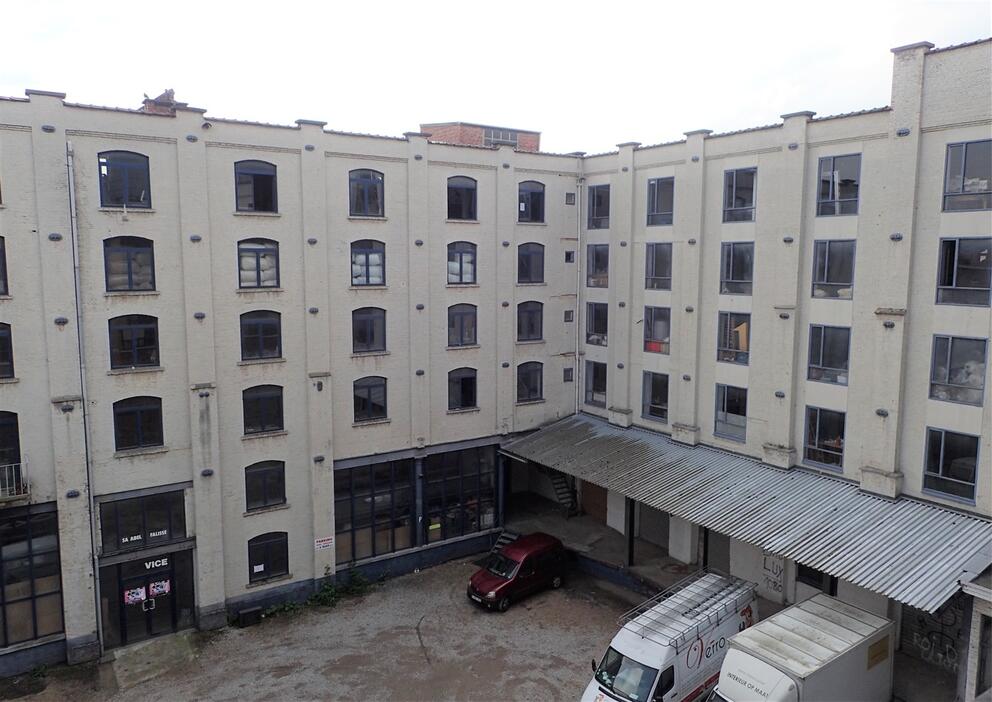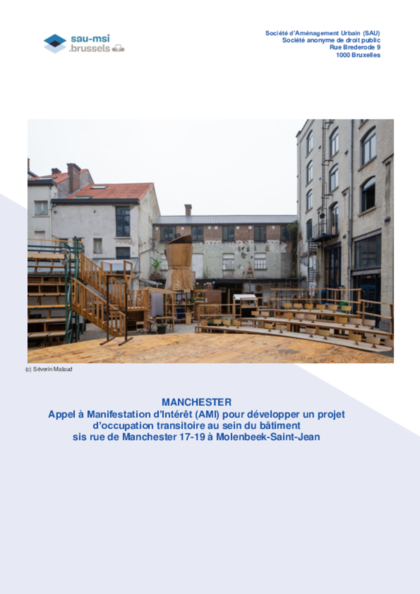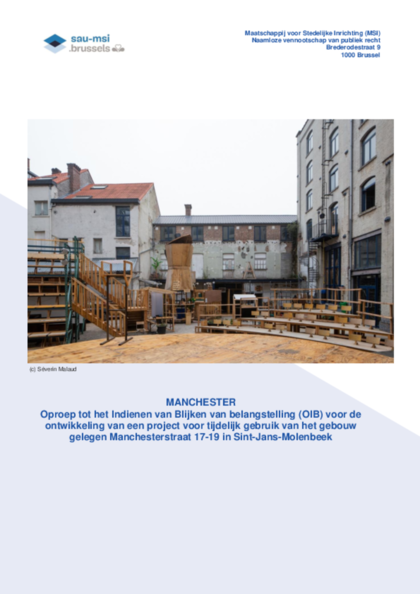SAU seeks temporary occupants for buildings at 17-19 Rue de Manchester
The Urban Development Corporation (SAU) is today publishing a call for expressions of interest (CEI) to identify project owners for the temporary occupation of nearly 3,000 m2 of the site at 17-19 Rue de Manchester in 1080 Molenbeek-Saint-Jean as a foretaste of the artistic and creative hub that will be developed there.
The buildings at 13-15 and 17-19 Rue de Manchester will ultimately be turned into premises for cultural, artistic and creative activity and related facilities such as administrative offices, a multipurpose hall and artists’ residences. This is one of the priority projects being financed under the ‘Heyvaert-Poincaré’ Urban Regeneration Contract (CRU 5) approved by the Government in December 2017. In April 2020, the Government also decided that Recyclart asbl’s occupation of the 13-15 Rue de Manchester site should be allowed to continue, in view of the activities that it is developing in relation to the future hub planned by the Region.
The SAU, in its capacity as delegated project manager, has decided to make use of the period prior to the work on the artistic and creative hub, which is scheduled for mid-2023. It plans to organise a temporary occupation programme for part of the buildings at 17-19 Rue de Manchester. It is working closely with the owner of the premises, SPRB Facilities Directorate, the municipality of Molenbeek and the current occupant, the non-profit organisation Décoratelier asbl. Under the Recovery Plan approved by the Regional Government in 2020 in response to the COVID-19 pandemic, budgetary resources have been made available to carry out the work needed to bring the buildings up to standard for this temporary occupation.
A foretaste of the final project
The purpose of the CEI launched by the SAU is to develop a temporary experimental showcase that offers a foretaste of the cultural, artistic and creative hub on which the Region has set its sights. This will be done by means of a coherent temporary project in which the different occupants will work in synergy rather than autonomously, and consisting of production workshops in the cultural and creative industries. The spaces will be rented out as basic structure plus façades, doors and windows, plus heating and plumbing – a sufficient level of comfort for them to be used as work spaces. The CEI relates to part of the upper floors of the two buildings located in the block’s interior, at the far end of the courtyard at 17-19 Rue de Manchester, with a total of nearly 3,000 m² spread over several floors. As far as possible, each floor will be allocated to a single project owner. However, the possibility is not excluded of a floor being shared between several project owners if opportunities for cohabitation between partners are identified.
Minister-President Rudi Vervoort explained: ‘Along the same lines as our successful ventures in connection with other development projects in Brussels, we want to use the preparatory phase of this conversion project to run some temporary projects before the large-scale work starts. The temporary occupation of buildings on Rue de Manchester should both bring life to the neighbourhood and open it up to the outside world. Spaces like this where people can experiment freely are of the utmost importance. They allow local residents, the people of Brussels in general and visitors to our Capital Region to really make the place their own. This way of sharing will create a new, unpredictable and creative story; it will also be characterised by a certain coherence in that the transition phase will be related to the long-term project, giving this place an identity that will endure beyond the completion of its temporary use.’
Gilles Delforge, the SAU’s Director, described himself as ‘happy that the SAU is once again able to contribute in this way to making the Region’s land and buildings available to the people of Brussels through a variety of temporary occupation programmes: See U in the context of Usquare.brussels, the conversion project at the former Fritz Toussaint barracks, since April 2019; MolenWest next to the Gare de l’Ouest railway station since September 2020; and Summer at Josaphat on the site of the former Josaphat marshalling yard last summer. Each of these programmes has proved very popular with the public in its own way, even earning the SAU and See U a Visit.brussels Award at the end of 2020.’
Catherine Moureaux, the mayor of Molenbeek, said that ‘this call is very important for my municipality. This iconic site, which will be the subject of an outstanding rehabilitation project in a few years’ time, could not remain unoccupied. These large buildings should be occupied by women and men working in the field of culture. The cultural sector is in drastic need of large spaces where work can be done and shows performed. I hope that this call will also make it possible for young artists from Molenbeek to take up premises here and that they open the place up to the Duchesse district and its inhabitants.’
The selection procedure
The deadline for the receipt of responses is 30 April 2021 at 11 am.
The call for expressions of interest, together with all the details of the procedure, is available in French or Dutch.
Project owners can now submit their applications, in accordance with the terms of the CEI. Applications will be evaluated by a Selection Committee made up of representatives of the SAU, the SPRB Facilities Directorate, the municipality of Molenbeek and Décoratelier. The selection criteria, detailed in the CEI, relate to factors such as the potential to offer a foretaste of the future cultural, artistic and creative hub; added value for the district and its inhabitants; the ability to integrate the Region’s vision and ambitions for the site; the ability to fit into a project with a global identity in synergy with the other occupants; the ability to work for the community in the management of the building; the ability to attract notice on a larger scale; the degree of compatibility with the site (its history, its spaces, its limitations, local residents, etc.) and with the other future occupants; technical, financial and administrative feasibility; and the quality of the team.
The selected project owners must meet various requirements, including: the signing of a short-term occupancy agreement; the payment of rent and a share of the site costs; the obligation to vacate the site by the due date; the self-financing of the investments necessary for the project and the associated expenses; compliance with the applicable regulations and obtaining all the necessary authorisations; the arrangement of insurance cover; etc.




